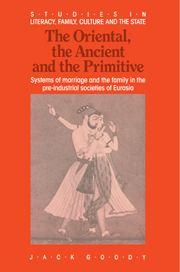 The Oriental, the Ancient and the Primitive
The Oriental, the Ancient and the Primitive Book contents
- Frontmatter
- Contents
- List of illustrations
- List of tables
- Preface
- 1 The nature of the enterprise
- PART I CHINA
- PART II INDIA
- PART III THE NEAR EAST
- PART IV GREECE AND ROME, YESTERDAY AND TODAY
- 13 The heiress in ancient Greece
- 14 Monogamy, property and control in Rome
- 15 Dowry, continuity and change in the eastern Mediterranean
- 16 Asia and Europe
- Notes
- References
- Index
15 - Dowry, continuity and change in the eastern Mediterranean
Published online by Cambridge University Press: 09 January 2010
- Frontmatter
- Contents
- List of illustrations
- List of tables
- Preface
- 1 The nature of the enterprise
- PART I CHINA
- PART II INDIA
- PART III THE NEAR EAST
- PART IV GREECE AND ROME, YESTERDAY AND TODAY
- 13 The heiress in ancient Greece
- 14 Monogamy, property and control in Rome
- 15 Dowry, continuity and change in the eastern Mediterranean
- 16 Asia and Europe
- Notes
- References
- Index
Summary
In our examination of the woman's property complex (which is the short-hand name I give to the cluster of variables linked to diverging devolution), we have found broadly three ways of devolving property on women, all of which were found in rural Greece, sometimes one receiving more stress in one region at a certain time but all present in the repertoire of the system if not of a local area at any one point in time. At one pole, the most male-oriented end, we find the stress placed on marriage prestations from the groom which were used, at least in part, as an indirect dowry for the wife; such practices vary according to the proportion which is retained by father and daughter respectively. In some codes, such as the Law of Manu, it was strictly forbidden for the father to retain or even transmit anything at all; the indirect dowry was out, not because it entailed ‘bride-purchase’ but because transfers from the groom implied that the father was unable to provide support for his own daughter. In some circumstances a man may keep back some of these payments, though at the same time he makes prestations to his daughter which may well be seen as ‘balancing the books’, or the daughter may allow her property to rest under her kin's control for the sake of protecting it. In most upper groups emphasis is placed on the direct endowment of a daughter at marriage.
- Type
- Chapter
- Information
- The Oriental, the Ancient and the PrimitiveSystems of Marriage and the Family in the Pre-Industrial Societies of Eurasia, pp. 429 - 464Publisher: Cambridge University PressPrint publication year: 1990


